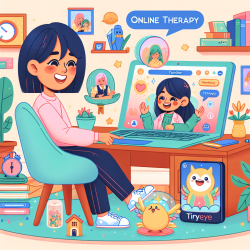In the ever-evolving landscape of education, the role of educational psychologists is becoming increasingly crucial. With the rise of online therapy services, like those provided by TinyEYE, educational psychologists have new tools at their disposal to support students effectively. This blog delves into the research-driven benefits of online therapy and how it can be a game-changer for schools.
The Rise of Telepractice in Educational Settings
Telepractice, the provision of therapy services through online platforms, has gained significant traction in recent years. According to a study published in the Journal of Educational Psychology, telepractice has shown to be as effective as in-person therapy for various psychological and educational interventions. This shift is not just a trend but a transformative approach that can revolutionize how we support students with Individualized Education Programs (IEPs).
Research-Driven Benefits of Online Therapy
Several studies highlight the numerous advantages of online therapy:
- Accessibility: Online therapy removes geographical barriers, ensuring that students in remote or underserved areas have access to high-quality therapeutic services.
- Flexibility: Scheduling is more adaptable, allowing sessions to be conducted at times that are most convenient for students, families, and schools.
- Consistency: Continuity of care is enhanced, as online platforms can easily track progress and ensure that interventions are consistent and data-driven.
- Engagement: Interactive tools and multimedia resources can make sessions more engaging for students, fostering better participation and outcomes.
Case Studies and Real-World Applications
Research from the American Psychological Association has demonstrated that online therapy can be particularly effective for students with IEPs. For example, a case study involving a student with speech and language impairments showed significant improvement in communication skills after six months of telepractice sessions. The flexibility and interactive nature of the online platform made it easier for the student to engage and progress.
Challenges and Solutions
While the benefits are clear, it's essential to acknowledge the challenges that come with implementing online therapy. Issues such as technology access, internet connectivity, and privacy concerns can pose obstacles. However, these challenges are not insurmountable. Schools can partner with organizations like TinyEYE to ensure that the necessary infrastructure and safeguards are in place.
Future Directions
The future of online therapy in educational settings looks promising. As technology continues to advance, the potential for even more innovative and effective therapeutic interventions grows. Educational psychologists can play a pivotal role in this evolution by staying informed about the latest research and advocating for the integration of telepractice into school systems.
Conclusion
In conclusion, online therapy offers a research-driven, effective, and flexible approach to supporting students, particularly those with IEPs. By embracing telepractice, educational psychologists can unlock new possibilities for student success, fostering a sense of joy and achievement in their educational journeys. TinyEYE is committed to partnering with schools to make these benefits a reality, ensuring that every student has the opportunity to thrive.










